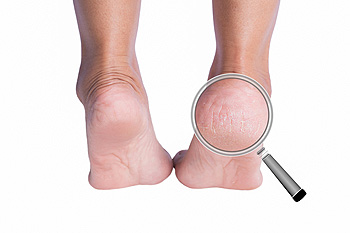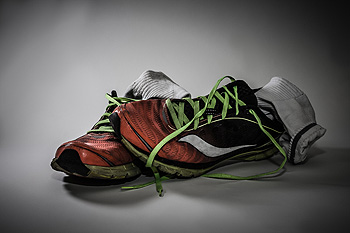(517) 487-5171
Fax (517) 908-0172
January 2021
Plantar Hyperhidrosis and Odors
Hyperhidrosis is a term that is used to describe excessive sweating. It is known as plantar hyperhidrosis when the feet sweat for the majority of the day. The purpose of sweating is to control the body’s temperature, but sweating can be excessive for several reasons such as genetic factors, hormonal concerns, or medical conditions like anxiety disorders. Having feet that sweat profusely can cause an unpleasant odor, which may lead to embarrassment. Additionally, safety may be compromised as a result of slipping. If you have plantar hyperhidrosis, it is recommended that you speak with a podiatrist who can help you with proper treatment techniques.
If you are suffering from hyperhidrosis contact Dr. Gary Cesar of Michigan Foot and Ankle Center. Our doctor can provide the care you need to attend to all of your foot and ankle needs.
Hyperhidrosis of the Feet
Hyperhidrosis is a rare disorder that can cause people to have excessive sweating of their feet. This can usually occur all on its own without rigorous activity involved. People who suffer from hyperhidrosis may also experience sweaty palms.
Although it is said that sweating is a healthy process meant to cool down the body temperature and to maintain a proper internal temperature, hyperhidrosis may prove to be a huge hindrance on a person’s everyday life.
Plantar hyperhidrosis is considered to be the main form of hyperhidrosis. Secondary hyperhidrosis can refer to sweating that occurs in areas other than the feet or hands and armpits. Often this may be a sign of it being related to another medical condition such as menopause, hyperthyroidism and even Parkinson’s disease.
In order to alleviate this condition, it is important to see your doctor so that they may prescribe the necessary medications so that you can begin to live a normal life again. If this is left untreated, it is said that it will persist throughout an individual’s life.
A last resort approach would be surgery, but it is best to speak with your doctor to find out what may be the best treatment for you.
If you have any questions please feel free to contact our offices located in Lansing and Mt. Pleasant, MI . We offer the newest diagnostic and treatment technologies for all your foot and ankle needs.
Patients Who Podiatrists Can Help
 Podiatrists specialize in assessing and diagnosing issues related to the feet and ankles. These issues can include skin problems, toenail disorders, foot injuries, foot infections, and overuse injuries. Because diabetic patients are at a higher risk for foot related issues, podiatrists also specialize in helping these patients manage their problems. Elderly patients whose feet hinder their activities should be under the care of a podiatrist, as should children who are having foot problems, especially if these problems affect their ability to walk. Podiatrists are also able to diagnose and treat sports related conditions such as sprains, fractures and overuse injuries. If you are struggling with any foot problem, visiting a podiatrist is highly suggested in order to get a proper diagnosis and treatment plan.
Podiatrists specialize in assessing and diagnosing issues related to the feet and ankles. These issues can include skin problems, toenail disorders, foot injuries, foot infections, and overuse injuries. Because diabetic patients are at a higher risk for foot related issues, podiatrists also specialize in helping these patients manage their problems. Elderly patients whose feet hinder their activities should be under the care of a podiatrist, as should children who are having foot problems, especially if these problems affect their ability to walk. Podiatrists are also able to diagnose and treat sports related conditions such as sprains, fractures and overuse injuries. If you are struggling with any foot problem, visiting a podiatrist is highly suggested in order to get a proper diagnosis and treatment plan.
If you are experiencing pain in the feet or ankles, don’t join the stubborn majority refusing treatment. Feel free to contact Dr. Gary Cesar from Michigan Foot and Ankle Center. Our doctor can provide the care you need to keep you pain-free and on your feet.
What Is a Podiatrist?
Someone would seek the care of a podiatrist if they have suffered a foot injury or have common foot ailments such as heal spurs, bunions, arch problems, deformities, ingrown toenails, corns, foot and ankle problems, etc.
Podiatric Treatment
A podiatrist will treat the problematic areas of the feet, ankle or lower leg by prescribing the following:
- Physical therapy
- Drugs
- Orthotic inserts or soles
- Surgery on lower extremity fractures
A common podiatric procedure a podiatrist will use is a scanner or force plate which will allow the podiatrist to know the designs of orthotics. Patients are then told to follow a series of tasks to complete the treatment. The computer will scan the foot a see which areas show weight distribution and pressure points. The podiatrist will read the analysis and then determine which treatment plans are available.
If you have any questions please feel free to contact our offices located in Lansing and Mt. Pleasant, MI . We offer the newest diagnostic and treatment technologies for all your foot and ankle needs.
Wounds That Don't Heal Need to Be Checked
What Can Cause Cracked Heels?
 A foot condition that can cause pain, discomfort, and an unsightly appearance can be described as cracked heels. It can occur as a result of wearing shoes that have an open back, or possibly from specific medical conditions. These can include thyroid disorders, diabetes, or kidney concerns. Additionally, people who are overweight may experience cracked heels from the excess weight and pressure the heels endure. Mild relief may be found when the feet are soaked in warm water, followed by applying a good moisturizer on them. Research has indicated it may help to add a vitamin regime into your daily routine, in addition to drinking plenty of fresh water. If you have cracked heels, it is suggested that you confer with a podiatrist who can offer effective treatment options.
A foot condition that can cause pain, discomfort, and an unsightly appearance can be described as cracked heels. It can occur as a result of wearing shoes that have an open back, or possibly from specific medical conditions. These can include thyroid disorders, diabetes, or kidney concerns. Additionally, people who are overweight may experience cracked heels from the excess weight and pressure the heels endure. Mild relief may be found when the feet are soaked in warm water, followed by applying a good moisturizer on them. Research has indicated it may help to add a vitamin regime into your daily routine, in addition to drinking plenty of fresh water. If you have cracked heels, it is suggested that you confer with a podiatrist who can offer effective treatment options.
Cracked heels are unsightly and can cause further damage to your shoes and feet. If you have any concerns, contact Dr. Gary Cesar from Michigan Foot and Ankle Center. Our doctor can provide the care you need to keep you pain-free and on your feet.
Cracked Heels
Cracked heels appear unappealing and can make it harder for you walk around in sandals. Aside from looking unpleasant, cracked heels can also tear stockings, socks, and wear out your shoes. There are several methods to help restore a cracked heel and prevent further damage.
How Do You Get Them?
Dry skin is the number one culprit in creating cracked heels. Many athletes, walkers, joggers, and even swimmers suffer from cracked heels. Age and skin oil production play a role to getting cracked heels as well.
Promote Healing
Over the counter medicines can help, especially for those that need instant relief or who suffer from chronic dry feet.
Wear Socks – Wearing socks with medicated creams helps lock in moisture.
Moisturizers – Applying both day and night will help alleviate dryness which causes cracking.
Pumice Stones – These exfoliate and remove dead skin, which allows for smoother moisturizer application and better absorption into the skin.
Change in Diet
Eating healthy with a well-balanced diet will give the skin a fresh and radiant look. Your body responds to the kinds of food you ingest. Omega-3 fatty acids and zinc supplements can also revitalize skin tissue.
Most importantly, seek professional help if unsure how to proceed in treating cracked heels. A podiatrist will help you with any questions or information needed.
If you have any questions, please feel free to contact our offices located in Lansing and Mt. Pleasant, MI . We offer the newest diagnostic and treatment technologies for all your foot care needs.
What Causes Achilles Tendonitis?
 The Achilles tendon is the large tendon on the back of the ankle that connects the calf muscle to the heel bone. Achilles tendonitis occurs when this tendon becomes inflamed. This pain can gradually worsen, and it does not need to be associated with a particular trauma. Most pain that is associated with Achilles tendonitis is worse in the mornings and after long periods of sitting, and the pain lessens throughout the day or during activity. The most common cause of Achilles tendonitis is over-pronation, which occurs when the arch of the foot flattens upon bearing weight and puts stress on the tendon. Improper shoes, poor stretching, a shorter tendon, or trauma can also lead to Achilles tendonitis. Because Achilles tendonitis can eventually lead to a painful rupture of the tendon, those who believe that they are experiencing symptoms should consult a podiatrist.
The Achilles tendon is the large tendon on the back of the ankle that connects the calf muscle to the heel bone. Achilles tendonitis occurs when this tendon becomes inflamed. This pain can gradually worsen, and it does not need to be associated with a particular trauma. Most pain that is associated with Achilles tendonitis is worse in the mornings and after long periods of sitting, and the pain lessens throughout the day or during activity. The most common cause of Achilles tendonitis is over-pronation, which occurs when the arch of the foot flattens upon bearing weight and puts stress on the tendon. Improper shoes, poor stretching, a shorter tendon, or trauma can also lead to Achilles tendonitis. Because Achilles tendonitis can eventually lead to a painful rupture of the tendon, those who believe that they are experiencing symptoms should consult a podiatrist.
Achilles tendon injuries need immediate attention to avoid future complications. If you have any concerns, contact Dr. Gary Cesar of Michigan Foot and Ankle Center. Our doctor can provide the care you need to keep you pain-free and on your feet.
What Is the Achilles Tendon?
The Achilles tendon is a tendon that connects the lower leg muscles and calf to the heel of the foot. It is the strongest tendon in the human body and is essential for making movement possible. Because this tendon is such an integral part of the body, any injuries to it can create immense difficulties and should immediately be presented to a doctor.
What Are the Symptoms of an Achilles Tendon Injury?
There are various types of injuries that can affect the Achilles tendon. The two most common injuries are Achilles tendinitis and ruptures of the tendon.
Achilles Tendinitis Symptoms
- Inflammation
- Dull to severe pain
- Increased blood flow to the tendon
- Thickening of the tendon
Rupture Symptoms
- Extreme pain and swelling in the foot
- Total immobility
Treatment and Prevention
Achilles tendon injuries are diagnosed by a thorough physical evaluation, which can include an MRI. Treatment involves rest, physical therapy, and in some cases, surgery. However, various preventative measures can be taken to avoid these injuries, such as:
- Thorough stretching of the tendon before and after exercise
- Strengthening exercises like calf raises, squats, leg curls, leg extensions, leg raises, lunges, and leg presses
If you have any questions please feel free to contact our offices located in Lansing and Mt. Pleasant, MI . We offer the newest diagnostic tools and technology to treat your foot and ankle needs.








